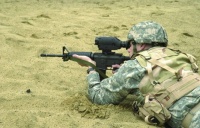
This is the vision of the Ministry of Defence (MoD), which is funding the development of solutions to reduce the burden on soldiers who must carry more than 60 AA batteries – and wear cumbersome wires that can weigh up to 2.5kg – to charge electronic devices.
Intelligent Textiles, based in Middlesex, has been chosen by the MoD to investigate uniforms woven with nylon yarns coated in silver. These conductive yarns would be fashioned into a uniform item such as a bullet-proof jacket and connected to a centralised battery pack.
It is an elegant solution to a power-management problem, said Asha Thompson, co-director of Intelligent Textiles, and it has drawn interest from the Canadian military.
’The Canadian military issues soldiers with more than 60 AA batteries, with 21 batteries used in the system and two sets of spares,’ she added. ’You only use approximately 30 per cent of that power because it takes 40 minutes every day to change out batteries. They throw away a lot of residual power left in the batteries because they can’t trust them for another mission.’
“These textiles are less subject to problems with fatigue breakage”
A centralised battery pack, with an intelligent charging system, could save time and weight.
Thompson’s colleague, co-director Stan Swallow, said the conductive textiles are less subject to problems with fatigue breakage than the wiring looms currently worn by soldiers.
Their weaving process, Swallow added, cuts down on the number of splices and connection points made with conventional cabling. Some of their experimental results, he said, have shown this can reduce electromagnetic interference with other equipment.
The major challenge up ahead for Intelligent Textiles will be to deliver power connectivity to areas such as the helmet and weapon, which are disconnected from the main body of the soldier. The company is looking into radical new types of connectors and magnetic induction coupling such as RFID.
Intelligent Textiles’ technology will undergo small trials with the Canadian and US militaries within two years, and it could become part of standard MoD kit in five years.










WildFusion helps robot traverse difficult terrain
<a...